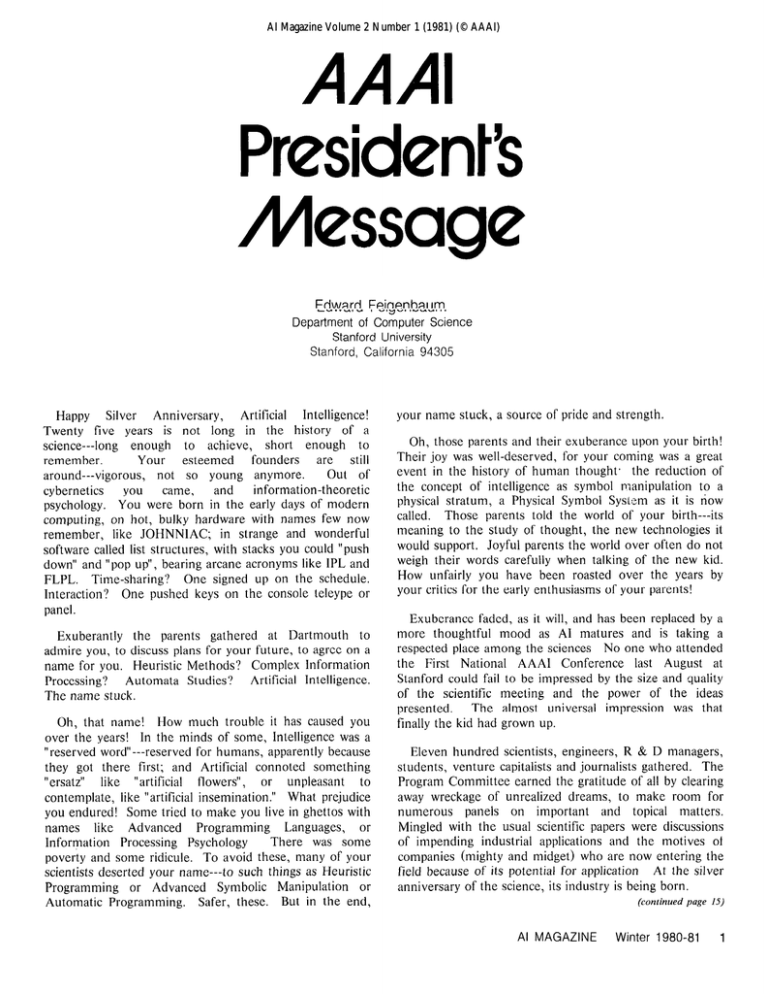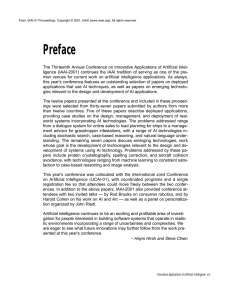President5 Message AAAI Edward Feigenbaum
advertisement

AI Magazine Volume 2 Number 1 (1981) (© AAAI) AAAI President5 Message Edward Feigenbaum Department of Computer Science Stanford University Stanford, California 94305 Happy Silver Anniversary, Artificial Intelligence! Twenty five years is not long in the history of a science---long enough to achieve, short enough to remember. Your esteemed founders are still around---vigorous, not so young anymore. Out of information-theoretic cybernetics came, and YOU psychology. You were born in the early days of modern computing, on hot, bulky hardware with names few now remember, like JOHNNIAC; in strange and wonderful software called list structures, with stacks you could “push down” and “pop up”, bearing arcane acronyms like IPL and FLPL. Time-sharing? One signed up on the schedule. Interaction? One pushed keys on the console teleype or panel. Exuberantly the parents gathered at Dartmouth to admire you, to discuss plans for your future, to agree on a name for you. Heuristic Methods? Complex Information Artificial Intelligence. Processing? Automata Studies? The name stuck. Oh, that name! How much trouble it has caused you over the years! In the minds of some, Intelligence was a “reserved word”---reserved for humans, apparently because they got there first; and Artificial connoted something “ersatz” like “artificial flowers”, or unpleasant to contemplate, like “artificial insemination.” What prejudice you endured! Some tried to make you live in ghettos with names like Advanced Programming Languages, or Information Processing Psychology There was some poverty and some ridicule. To avoid these, many of your scientists deserted your name---to such things as Heuristic Programming or Advanced Symbolic Manipulation or Automatic Programming. Safer, these. But in the end, your name stuck, a source of pride and strength. Oh, those parents and their exuberance upon your birth! Their joy was well-deserved, for your coming was a great event in the history of human thought. the reduction of the concept of intelligence as symbol manipulation to a physical stratum, a Physical Symbol System as it is riow called. Those parents told the world of your birth---its meaning to the study of thought, the new technologies it would support. Joyful parents the world over often do not weigh their words carefully when talking of the new kid. How unfairly you have been roasted over the years by your critics for the early enthusiasms of your parents! Exuberance faded, as it will, and has been replaced by a more thoughtful mood as AI matures and is taking a respected place among the sciences No one who attended the First National AAAI Conference last August at Stanford could fail to be impressed by the size and quality of the scientific meeting and the power of the ideas presented. The almost universal impression was that finally the kid had grown up. Eleven hundred scientists, engineers, R & D managers, students, venture capitalists and journalists gathered. The Program Committee earned the gratitude of all by clearing away wreckage of unrealized dreams, to make room for numerous panels on important and topical matters. Mingled with the usual scientific papers were discussions of impending industrial applications and the motives 01 companies (mighty and midget) who are now entering the field because of its potential for application At the silver anniversary of the science, its industry is being born. (continued Al MAGAZINE page Winter 1980-81 IS) 1 25. B. Hayes-Roth, F. Hayes-Roth, S. Rosenschein, and S. Cammarata, “Modeling Planning as an Incremental, Opportunistic Process,” Proc. Sixth International Joint Conference on Art$cial Intelligence, Tokyo, Japan (August 1979). 26. V.R. Lesser and L.D. Erman, “A Retrospective View of the Hearsay-II Architecture,” Proc. F$h International Joint Conference on ArtiJicial Intelligence, pp. 790-800, Cambridge, Massachusetts (August 1977). 27. R.E. Fikes, P.E.Hart, and N.J. Nilsson, “Some New Directions in Robot Problem Solving,” in B. Meltzer and D. Michie (eds.) Machine Zntelligeruze 7, pp. 405430 (Edinburgh Univ. Press, Edinburgh, 1972). 28. R.G. Smith, “A Framework for Distributed Problem Solving,” Proc. Sixth International Joint Conference on Artificial Intelligence, Tokyo, Japan (August 1979). 29. D. E. Appelt, “A Planner for Reasoning about Knowledge and Action,” Proc. First National Corzfkence on Artijkial Intelligence, Stanford, California (August 1980). 30. K. Konolige and N. J. Nilsson, “Multiple-Agent Planning Systems,” Proc. First National Coqfkrence on Art@ial Intelligence, Stanford, California (August 1980) 31. D.D. Corkill, “Hierarchical Planning in a Distributed Environment,” Proc. Sixth International Joint Confkrence on ArtiJcial Intelligence, Tokyo, Japan (August 1979). 32. A.E. Knowledge Robinson and D E. Wilkins, “Representing in an Interactive Planner,” Proc. First National Conference on Art$cial Intelligence, Stanford, California (August 1980). Parents and friends worry too about your sense of history, for like most young adults, you approach each new task as if the past holds no lessons. Have you learned from your many victories that they were mainly triumphs of experimental science; that your winning strategy has been to test ideas in the medium of programs that run? Your work has been most vulnerable to failure when your For without computing resourses have been inadequate substantial machines for your laboratories, you are like an astronomer with too small a telescope. he can see certain interesting things, but his horizons are limited. In France and Germany, your empirical work is inhibited by the heavyhandedness of bureaucracies and prominent mathematicians whose entrenched position prevents your scientists from obtaining the funds, computers, and communications they need to move England, alas, sleeps, from a dose of pills forward administered by their government, though whether accidentally or intentionally is still debated It sleeps restlessly, however, and may soon awake in a burst of industrial activity, The Japanese perceive your potential for application and are moving with their characteristic energy and 7eal to master your concepts and techniques. How fortunate YOLI are, AI, that the path of most testing of intelligent progress---the building and programs---is also the path of most fun for your scientists Surely some of them entered the field because its concepts and methods seemed the best available for modeling But just as surely, most of your human cognition scientists have entered AI because of the immense fascination---the age-old fascination---with the construction Little is spoken of this motive of inteliigent artifacts because it is regarded by some as base; just as some regard as base the idea that science should be fun But watch the $lOOK Chess Prize Competition Fun and challenge will fuel those fires, the money just supplies the focus of attention Parents and friends fret and worry that perhaps too much is being expected of you as a new adult Perhaps, AI, you are not as smart as you seem to be; not enough brains or experience to go with your good looks. Perhaps in venturing to attack the big and difficult problems of real application you will fall, will cripple yourself To put it bluntly, are you able to hold a job? It’s a rough and demanding practical world out there. Increasingly our world is a world of information processing, and those who do the world’s work are looking to computer science and technology for help Much of what they need is not numeric or calculational, but Biology? Medicine? Law? symbolic and inferential Management? The information processing needs of most professions do not fit the molds that computer science has constructed for physical science, engineering and business data processing AI, you alone own the mastery of the ideas and methods that will be necessary to bring the power of symbolic computing to the service of the world’s needs Yes, you can be rich as well as famous. Do you have enough talent to support the adulthood of your science? Are there only a few dozen contributors clustered in a handful of places, or does your talent run deep? Are you gearing up to produce more trained specialists to staff your new industry? Are the industry and university labs eating your seed corn with a view toward the short-run? Celebrate your Silver Anniversary with joy, Al. You will have many more, as you earn your place 01 preeminence among the sciences, For you carry the seeds of human understanding of the greatest importance. What, precisely, is the nature of mind and thought? You stand with molecular biology, particle physics, and cosmology as owners of the best questions of science. President’s Message (conrinued from page I) Al MAGAZINE Winter 1980-81 15



